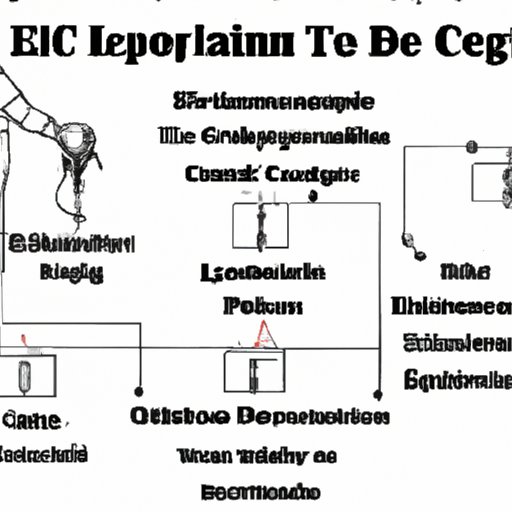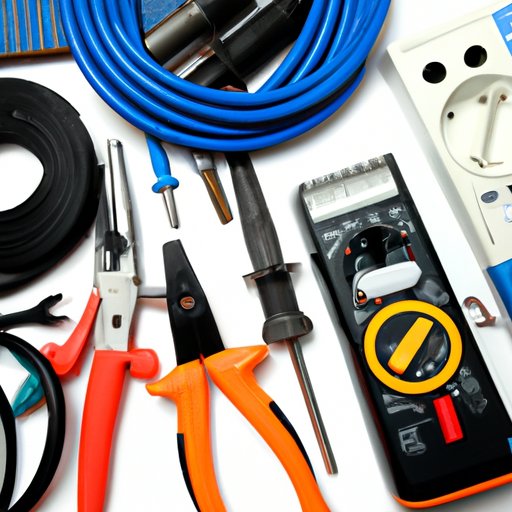Introduction
An electrician is a professional who specializes in the installation, repair, and maintenance of electrical systems. Electricians work in both residential and commercial settings and must have a thorough understanding of the National Electrical Code (NEC) and other local regulations. Becoming an electrician requires completing certain education and training requirements, acquiring certifications, and participating in apprenticeship programs.

Outline the Steps to Becoming an Electrician
The first step to becoming an electrician is to meet the educational requirements. Although there is no specific degree or certificate that is required, it is recommended to take courses in electricity, electronics, mathematics, construction, and safety. Additionally, it is important to become familiar with the National Electrical Code (NEC).
Once the educational requirements are met, electricians can start the process of acquiring certifications. To become a journeyman electrician, applicants must pass an exam administered by their state or local jurisdiction. The exam tests knowledge of the NEC and other safety standards. After passing the exam, electricians may then apply for a master electrician certification.
Finally, many electricians participate in apprenticeship programs in order to gain practical experience. Apprenticeship programs provide on-the-job training under the guidance of experienced electricians. Apprentices usually receive a combination of classroom instruction and hands-on experience. Upon completion of the program, apprentices may be eligible to take the journeyman electrician exam.

Explain the Different Types of Electrician Certifications
Journeyman electrician certification is the most common type of certification for electricians. In order to obtain this certification, electricians must pass an exam that covers topics such as the National Electrical Code (NEC), electrical theory, and safety practices. This certification allows electricians to work independently and perform a wide range of electrical tasks.
Master electrician certification is the highest level of certification available to electricians. This certification requires extensive experience and knowledge in all aspects of electrical work. Master electricians are able to design and install complex electrical systems and oversee the work of other electricians.
In addition to journeyman and master electrician certifications, there are also specialty certifications available. These certifications allow electricians to specialize in specific areas such as solar energy, fire alarm systems, and industrial control systems.
Describe the Essential Qualities of an Electrician
In order to be successful as an electrician, it is important to possess certain qualities. Attention to detail is essential, as electricians must be able to identify potential problems and make precise repairs. Problem-solving skills are also necessary, as electricians must be able to troubleshoot and diagnose issues quickly and efficiently.
Electricians must also be able to work well with others. Working with clients, contractors, and other tradespeople is an important part of being an electrician. Safety awareness is another essential quality for electricians, as they must be able to recognize and mitigate any potential hazards.

Highlight the Benefits of Working as an Electrician
Working as an electrician offers many benefits. One of the most significant benefits is job security. According to the U.S. Bureau of Labor Statistics, employment of electricians is projected to grow 8 percent from 2019 to 2029, much faster than the average for all occupations.
Another benefit of being an electrician is the variety of job opportunities available. Electricians can work in residential, commercial, and industrial settings, as well as specialize in specific areas such as renewable energy or security systems. Additionally, electricians typically enjoy good pay and benefits.
Detail the Tools and Equipment Necessary for Electrical Jobs
Electricians use a variety of tools and equipment on the job. Hand tools are often used for simple tasks such as stripping wire and making connections. Power tools are used for more complex tasks such as drilling holes and cutting conduit. Specialized testing equipment is also used to test circuits and measure voltage.
Conclusion
Becoming an electrician requires meeting certain educational requirements, acquiring certifications, and participating in apprenticeship programs. Electricians must also possess certain qualities such as attention to detail, problem-solving skills, and safety awareness. There are many benefits to working as an electrician, including job security, good pay, and variety of job opportunities. Finally, electricians use a variety of tools and equipment to complete their electrical tasks.
If you are considering a career as an electrician, it is important to understand the process and the qualifications necessary to become one. With the right education, training, and experience, you can become a successful electrician.
(Note: Is this article not meeting your expectations? Do you have knowledge or insights to share? Unlock new opportunities and expand your reach by joining our authors team. Click Registration to join us and share your expertise with our readers.)
